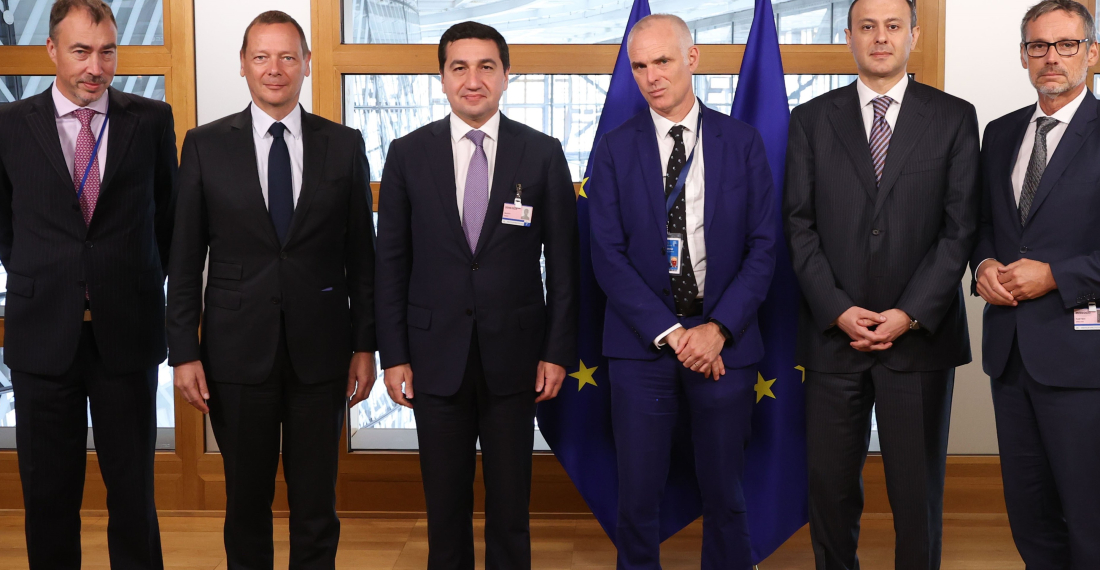The European Union on Monday (26 September) hosted high level diplomatic discussions in Brussels between senior officials from Armenia and Azerbaijan. The main objective of the meeting was to prepare for a summit between Azerbaijani president, Ilham Aliyev and Armenian prime minister, Nikol Pashinyan, with the participation of the president of the European Union Charles Michel, the president of France Emanuel Macron, and the Chancellor of Germany, Olaf Scholz. Although the meeting has not been formally confirmed it is now considered very likely.
A statement from Brussels said:
"Under the auspices of President Michel, his Diplomatic Advisers Simon Mordue and Magdalena Grono hosted a meeting between Secretary of Armenia’s Security Council Armen Grigoryan and Foreign Policy Advisor to the President of Azerbaijan Hikmet Hajiyev, with the participation of Diplomatic Advisers to French President Macron and German Chancellor Scholz, Emmanuel Bonne and Jens Ploetner, as well as EU Special Representative for the South Caucasus and the crisis in Georgia Toivo Klaar.
President Michel joined the participants for a brief exchange.
The EU invited participants to exchange views on the current situation on the ground and various efforts aimed at addressing the urgent needs of the local population.
The European Union closely follows all these developments and has been engaged at the highest level to help alleviate the impact of hostilities on civilians. The EU reiterated in this context its position on Azerbaijan’s military operation last week.
Hikmet Hajiyev outlined Azerbaijan’s plans to provide humanitarian assistance and security to the local population. The EU stressed the need for transparency and access for international humanitarian and human rights actors and for more detail on Baku’s vision for Karabakh Armenians’ future in Azerbaijan. The EU is providing assistance to Karabakh Armenians.
The meeting also allowed for intense exchanges between participants on the relevance of a possible meeting of the leaders in the framework of the Third EPC Summit scheduled for 5 October 2023 in Granada.
The participants took note of the shared interest of Armenia and Azerbaijan to make use of the possible meeting in Granada to continue their normalisation efforts.
In this regard, Armen Grigoryan and Hikmet Hajiyev engaged in talks on possible concrete steps to advance the Armenia-Azerbaijan peace process in the upcoming possible meeting, such as those with regard to border delimitation, security, connectivity, humanitarian issues, and the broader peace treaty.
Concrete action and decisive compromise solutions are needed on all tracks of the normalisation process.
The EU believes that the possible meeting in Granada should be used by both Yerevan and Baku to reiterate publicly their commitment to each other’s territorial integrity and sovereignty in line with agreements reached previously in Prague and Brussels.
In a separate development, the European Union announced, also on Monday, that it was allocating an additional humanitarian funding of €5 million in response to the increasing needs resulting from the Nagorno-Karabakh crisis. The conflict escalation and subsequent ceasefire is expected to trigger a mass exodus of people from Nagorno-Karabakh to Armenia, with approximately 13 500 refugees having crossed the border already. At the same time, there is a major food shortage and lack of access to electricity and water within the Nagorno-Karabakh enclave.
The €5 million humanitarian funding includes € 500,000 of emergency support announced last week and €4.5 million new funding, which will:
- assist people displaced from Nagorno-Karabakh to Armenia. This aid will be delivered by various EU humanitarian partners operating in Armenia to reach around 25 000 people. The priority is to provide cash assistance, shelter, food security and livelihoods assistance.
- assist vulnerable people inside Nagorno-Karabakh. This aid will be channelled through the International Committee of Red Cross and aims to support around 60 000 people with food, healthcare, shelter and logistics.
The EU is also deploying a humanitarian expert to the region who will work hand in hand with humanitarian partners on the ground to ensure a rapid response to the crisis.
Including the new funding announced today, the European Commission has provided more than €25.8 million in humanitarian aid since the conflict escalation in Nagorno-Karabakh in 2020. At the outbreak of the 2020 conflict in Nagorno-Karabakh, the Commission promptly responded with €6.9 million in humanitarian support to address the needs of the most vulnerable among the civilians directly affected by the hostilities.
EU humanitarian funding is provided in line with the humanitarian principles of humanity, neutrality, impartiality, and independence. The European Commission also plays a key role in facilitating humanitarian coordination and information sharing among various organisations, including donors, authorities and humanitarian partners.







